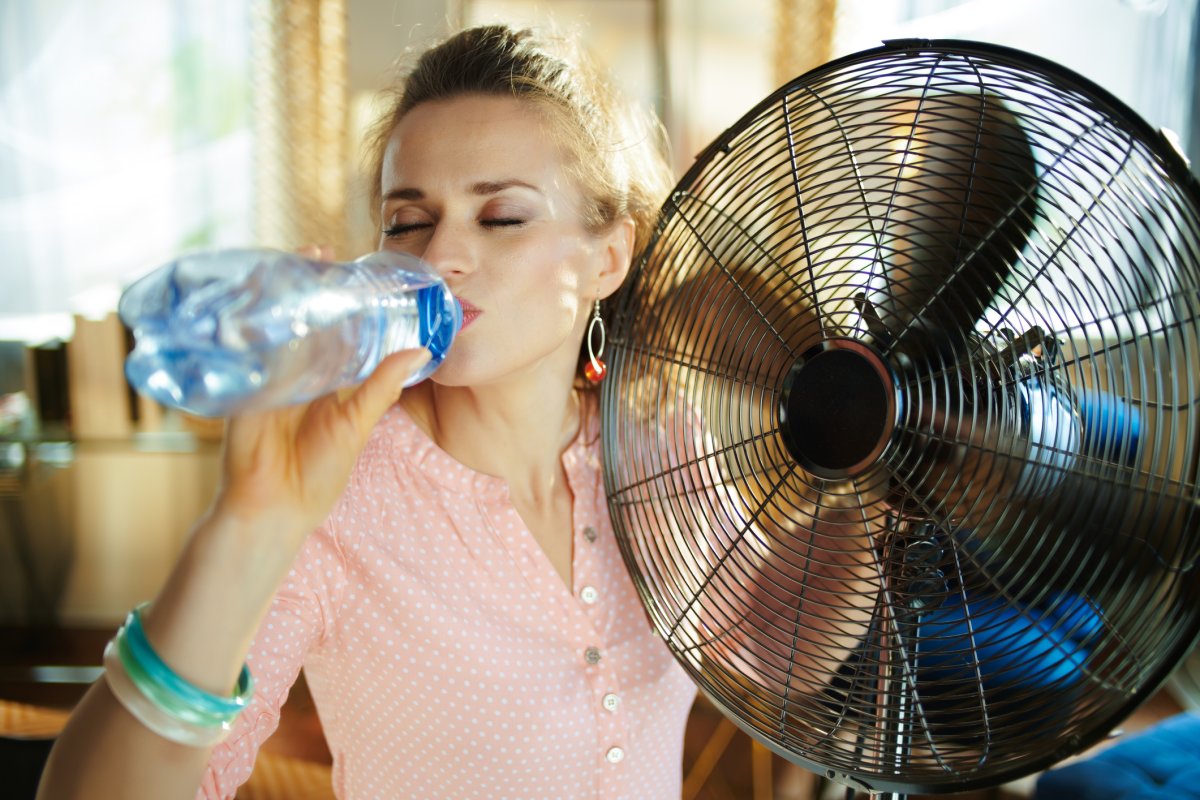Using electric fans during heatwaves with hot and dry conditions can be dangerous, say scientists who warn that residents in some parts of the U.S. are among those at risk.
When the air temperature rises above the body temperature, convention can mean using a fan speeds up the transfer of dry heat towards the body. Scientists advised against using fans in very hot but dry conditions climbing above 45 degrees Celsius (113 degrees Fahrenheit) with less than 10 percent humidity. These conditions are seen in the South Central United States (Arkansas, Louisiana, Oklahoma, and Texas), as well as South Australia, and the Middle East. The average normal body temperature is generally accepted as 98.6F (37C)
Fans can be safely used in most other parts of the U.S., as well as Southeast Asia, South America, and Europe where temperatures rarely climb above 40C (104F) and humidity is generally greater than 30 percent to 40 percent during heatwaves. In fact, in these cases the devices could be safer and more accessible than air conditioning, while cutting carbon emissions by using less electricity, the scientists said.

Researchers recruited 12 healthy men for their study published in the journal Annals of Internal Medicine. They simulated two heatwave conditions in a special chamber: very hot and dry; and cooler and more humid with a higher heat index. The heat index is a measure of how hot it feels when humidity and air temperature are considered. For example, the air temperature of 96F with 65 percent humidity would create a heat index of is 121F, according to the National Weather Service.
In experiments split over two days, the men were asked to wear shorts and sit for two hours in the special chamber. Some tests involved a fan, while others didn't to act as the control.
The temperature in the hot, humid room was 39.9C (103.82F) with a fan and 40.3C (104.54F) without, but had a heat index of 55.1C (131.18F) and 56.9C (134.42F) respectively. The very hot and dry setting was 47.2C (116.96F) with a fan and 46.7C (116.06F) without, with the heat index staying largely the same.
Researchers measured factors including the men's body temperature, as well as their heart rate and blood pressure, whether they were dehydrated, and their comfort levels.
The researchers found that in hot, humid conditions where the heat index was 56C (132.8F), fans could help lower core temperature and cardiovascular strain on a person, and make them feel more comfortable. However, in hot and dry conditions, fans were found to be "detrimental," even when the heat index was 46C (114.8F).
"These findings highlight issues that may arise when heat index values are used to recommend fan use during heat waves," the authors wrote.
Simon Hodder of the Environmental Ergonomics Research Centre at Loughborough University, who has researched the safety of electric fans during heatwaves but did not work on this study, told Newsweek: "The use of electric fans as a cooling intervention in conditions with an air temperature above 35C (95F) has until recently been considered as detrimental."
Hodder said the study shows that while effective above 35C (95F) the use of a fan in dry conditions of low relative humidity "will be detrimental to health."
Professor Mike Clarke of Queen's University Belfast, who co-authored a review showing electric fans should be avoided when the mercury hits 30C or above but did not work on the new study, told Newsweek the new research was well-conducted.
However, Clarke said the study was limited because it was carried out in a laboratory, so more research is needed to confirm what would happen in people's homes or in institutions such as hospitals or care homes for older people. The study also focused on young men, rather than those who might be more vulnerable such as older people or those with conditions such as heart disease.
"Actual heatwaves are much more complex than the laboratory setting because they are also likely to impact on other things that affect health such as, for example, eating and drinking, physical activity, quality of sleep," said Clarke.
Hodder told Newsweek: "It could be considered surprising that at a lower air temperature the participants had an increased response to the environment. But this is due to the fan impacting the body's ability to evaporate sweat fully from the skin, it helps to evaporate the sweat more rapidly before if effectively cools the person."
He said the study didn't answer at what relative humidity level the fan would become effective.
Hodder explained: "Fans do have a benefit above 35C (95F). Considering just air temperature does not give the complete picture and that humidity is also a very important factor. In hot dry conditions the addition of misting or application of moisture to the skin via a cloth would help to improve the heat loss and the fan more effective."
Uncommon Knowledge
Newsweek is committed to challenging conventional wisdom and finding connections in the search for common ground.
Newsweek is committed to challenging conventional wisdom and finding connections in the search for common ground.
About the writer
Kashmira Gander is Deputy Science Editor at Newsweek. Her interests include health, gender, LGBTQIA+ issues, human rights, subcultures, music, and lifestyle. Her ... Read more
To read how Newsweek uses AI as a newsroom tool, Click here.








